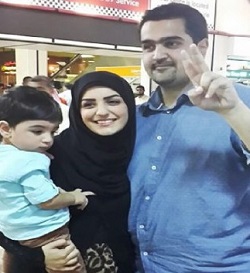On 22 February 2015, Americans for Democracy & Human Rights in Bahrain (ADHRB), the Bahrain Center for Human Rights (BCHR), and the Bahrain Institute for Rights and Democracy (BIRD) received confirmed reports that Bahraini authorities tortured Husain Jawad Parweez, a well-known human rights activist and head of the European-Bahraini Organization for Human Rights, to extract a coerced confession. The undersigned NGOs condemn in the strongest terms the Government of Bahrain’s continued use of torture to extract coerced confessions and call for an immediate investigation into the allegations.
Please click here for a PDF of this statement.
Parweez was arrested on 16 February and taken to the General Directorate of Criminal Investigations (CID), where he was interrogated about his alleged participation in riots and illegal assemblies, as well as possession of Molotov cocktails. At the CID, interrogators beat Parweez and deprived him of sleep, water, and use of a toilet. Interrogators kept him handcuffed from behind and blindfolded in a small, cold room for the duration of his interrogation. Parweez was subjected to psychological torture as well, with interrogators insulting him, threatening to harm his wife, and forcing him to listen to other detainees being electrocuted. Parweez was also sexually assaulted by a female officer, who took of his clothes and touched his genitals. He was not allowed access to his family or lawyer while at the CID.
On 21 February, Parweez was taken to the Public Prosecution where he confessed to the charges leveled against him to avoid further torture. Despite showing signs of abuse, the prosecutor did not ask Parweez about his apparent exhaustion or dirty clothes. Instead, Parweez was accused of additional charges, such as receiving money from inside and outside Bahrain to support and fund riot groups.
The Government of Bahrain has ignored appeals to release Parweez from well-respected international organizations, such as Amnesty International, Frontline Defenders, and The International Federation for Human Rights. Bahraini authorities have also disregarded repeated requests from the United Nations Special Rapporteur on Torture, Juan Mendez, to visit the country to investigate allegations of torture.
Parweez’s father, Mohammed Hassan Jawad, is currently serving a fifteen-year sentence in prison for his peaceful activism. He was subjected to torture in 2011 and sentenced by military court before he was re-tried at the civilian court.
The continued use of torture by Bahraini authorities to extract a coerced confession is a clear violation of international covenants and conventions. In Article 14 (3 – g), the International Covenant on Civil and Political Rights (ICCPR) states that no one should be “compelled to testify against himself or to confess guilt.” Also, Articles 12, 14, and 16 of the Convention against Torture and Other Cruel, Inhuman or Degrading Treatment or Punishment (CAT) ensures that each State party should guarantee “a prompt and impartial investigation, wherever there is reasonable ground to believe that an act of torture has been committed in any territory under its jurisdiction,” and “ensure in its legal system that the victim of an act of torture obtains redress and has an enforceable right to fair and adequate compensation, including the means for as full rehabilitation as possible.” Additionally, Articles 10, 11, 12, and 13 of the CAT prohibit the use of torture other cruel, inhuman, or degrading treatment of punishment and guarantees fair treatment at all stages of judicial proceedings.
The aforementioned organizations call on the United Kingdom, the European Union, the United States and other national and international bodies to:
- Pressure the Government of Bahrain to immediately and unconditionally release Husain Jawad Parweez and all other human rights activists and prisoners of conscious, especially those whose convictions are based on confessions extracted under torture and duress;
- Demand that the Government of Bahrain stop using torture as a mean to extract confessions;
- Demand that the Government of Bahrain end systematic impunity, investigate torture complaints, and hold accountable those officials who were involved in torture, especially at the high ranks;
- Urge the Government of Bahrain to reform the judicial system to stop using it as a tool for reprisal against human rights and political activists; and;
- Pressure the Government of Bahrain to allow United Nations procedures access to the country.





